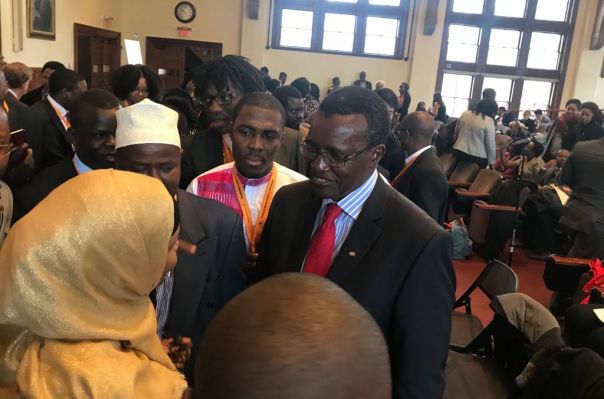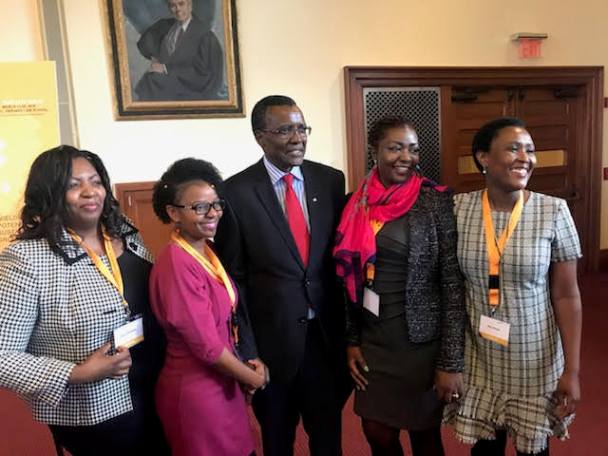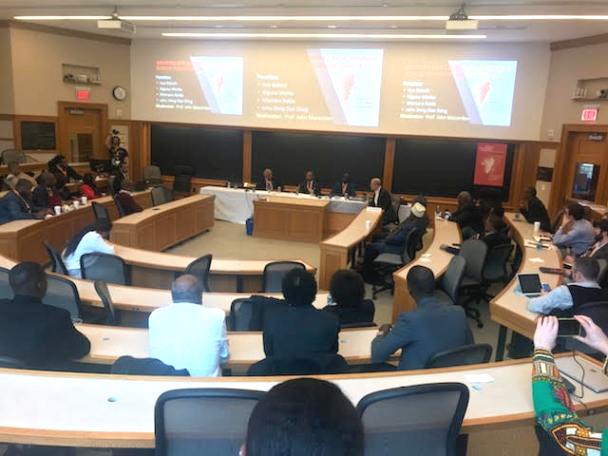| |||||||||
|
|||||||||
|
By:
Simon Ngugi | |||||||||
| Posted:
Mar,27-2018 15:13:36
| |||||||||
|
CAMBRIDGE, Mass.,__In his Keynote Speech during the opening of the just conlcuded 9th African Development Conference at the Harvard Law School in Cambridge, Massachusetts on Friday, Kenya's Chief Justice and President of the Supreme Court of Kenya, the Honorable David Maraga said that bad governance resulting in injustices as well as disregard for the rule of law, corruption, state capture and unequal development are the major impediments to sustainable growth and socio-economic development in the African continent. In his maiden visit to the Harvard University, which he noted was one of the most prestigious Institutions of higher learning in the world, the Hon. Maraga mesmerized delegates with his mastery of language and facts as he explained how the rule of law is critical to growth and development. The delegates, who included Harvard University students and faculty as well as other African Business leaders and college students from surrounding colleges and from as far as New York and Indiana occasionally cheered and applauded the Kenyan CJ as he went on to explain how the absence of rule of law hampers growth, stalls development and subsequently hurts Africa as a continent. In line with this year's Conference theme which emphasized that the time for Africa was now and that it was time to "Wield Africa's potential for Sustainable Growth", Chief Justice Maraga stated that the law creates an environment of creativity which spurs development and growth. The sustainability of Africa's potential is, therefore, "totally dependent on conducive environments across Africa which would ensure human rights are respected; law and order prevails; and the rights of economic actors are respected and enforced," he said.
Maraga added that that equitable access to resources is key for growth and development but was lacking in Africa. "There can be no meaningful development without inclusivity.Inclusive development not only ensures the active participation of all in development matters but also guarantees social justice that has empirically been shown to yield broad-based benefits for all in the society." The Kenyan Chief Justice, now renowned across the globe for his recent landmark ruling that nullified the first Kenyan elections held in Augusts 2017--then upheld the re-election of president Uhuru Kenyatta in the subsequent election re-run boycotted by his main rival and opposition leader, Raila Odinga two months later-- ended his speech by urging African countries to try a new paradigm of development through democratic institutions founded y the rule of law and an independent, competent Judiciary. "Africa's development problem is a political one not an economic or legal one," the Chief Justice pointed out, adding that that most of African Countries' constitutions are transformative in nature. "It is incumbent upon Courts in Africa to seize the transformative provisions of these Constitutions to link governance with development while effectively limiting governments through the rule of law," he said. He outlined the efforts that the Kenyan Judiciary has undertaken to increase access to equitable and expeditious delivery of justice including efforts to curb corruption and increase personal integrity of judicial staff; increase functional and physical access to courts as well as clearing case backlogs and delays. Maraga said the Kenyan Judiciary has begun several initiatives as part of a reform effort dubbed "Sustaining Judiciary Transformation". Among such initiatives include expanding the High Court System to all 47 counties in the country; automating court procedures; increasing Court personnel and instituting Performance Measurement and Management and Appraisal System. In addition, the courts have now begun to speed up disposal of cases including the activation of small claims courts and mainstreaming alternatives of dispute resolution including traditional justice systems. Justice Maraga pointed out that the Kenyan Judiciary has embraced innovative jurisprudence in accordance with Article 23 of the Kenyan Constitution in fashioning appropriate remedies which go beyond the traditional declaratory reliefs which are routinely ignored by the government. Consequently, he said, the Kenyan Judiciary has issued structural prohibitions in the enforcement of social and economic rights. While responding to questions from delegates during the Q&A, Maraga clarified that his landmark ruling nullifying the August 6 Kenyan election was sound within the law according to documents and other evidence produce before the Supreme Court. "When making a ruling on such a case with such a huge magnitude to many people, you always have to ask yourself what you want for the best of your country. After looking at the evidence produced, i had no doubts that that election was not conducted in best manner expected. Besides, we had 4 other judges who concurred, two dissented and one was sick," he said to loud applause. The chief justice received a standing ovation when he narrated how he ordered the immediate arrest of a policeman who had approached him when he served as a high court judge in Mombasa urging him to dismiss a case against of the policeman's relatives in return for "something small" (kickback). "I had him arrested right away. People told me I was stupid as I missed to make a lot of money on that deal, but I said I needed to uphold my integrity." "If we let Africa go down, it will go down with all of us," he concluded. Chief Justice Maraga was accompanied by Justice (Professor) Joel M. Ngugi, Presiding Judge at the High Court of Kenya at Kiambu and a Harvard Law School alumnus who led a panel on Constitutionalism, Rule of Law and Development during the same Conference, and the Chief of Staff in the Office of the Chief Justice, Duncan Okello. "This was a great conference. Cleary, there is a great future in Africa bases on all the discussions held that updated us on the current progress back in our motherland. I wish more young Africans could attend this conference and see a different picture of Africa that we always see in the mainstream western media," said Giana Mathey of Mali, a delegate from City University in New York who attended the conference with over10 other fellow students.
"This was awesome. I love Africa and I came here to learn even more. There is a lot of future for Africa. I am glad to see a lot of African professionals and students here discussing very important strategies to spur even more faster development in the continent," said Bakari Qijia Xiao, a.k.a Bakari Mchina, a Swahili speaking Chinese student of African studies at Harvard. TheHarvard African Development Conferenceis organized annually by Harvard students from Africa or with an interest in Africa. This year, more than 300 delegates attended the conference.Those who organized the conference this year were drawn from Harvard Law School; Harvard School of Government, Harvard School of Design as well as the Harvard College and Center for African Studies. The Conference Co-Chairs were: Ms. Jacquelene Mwangi, LLM Candidate, Harvard Law School; Ms. Adaora Ndukwe-Ugwu, MC/MPA Candidate & Edward Mason Fellow Harvard Kennedy School of Government; Ms. Mihret Woldesmait, JD Candidate at Harvard Law School (2019); and Ms. Priya Singh, Mid-Career Master in Public Administration at Harvard Kennedy School and Fellow at the Harvard Center for African Studies. During the Conference, a special dedication was held to the late Calestous Juma, a Kenyan professor at the Harvard Kennedy School of Government. Prof. Juma was an internationally recognized authority in the application of science and technology to sustainable development. Prof. Juma died in December, 2017. | |||||||||
|
Source:
AJABU AFRICAN NEWS
| |||||||||
|
||||||||||||||||||||||||||||||||||||||||||||||||||||||||||||||||||||||||||||||||||||||||||||||||||||||||||||||
|
||||||||||||||||||||||||||||||||||||||||||||||||||||||||||||||||||||||||||||||||||||||||||||||||||||||||||||||


.jpg)






